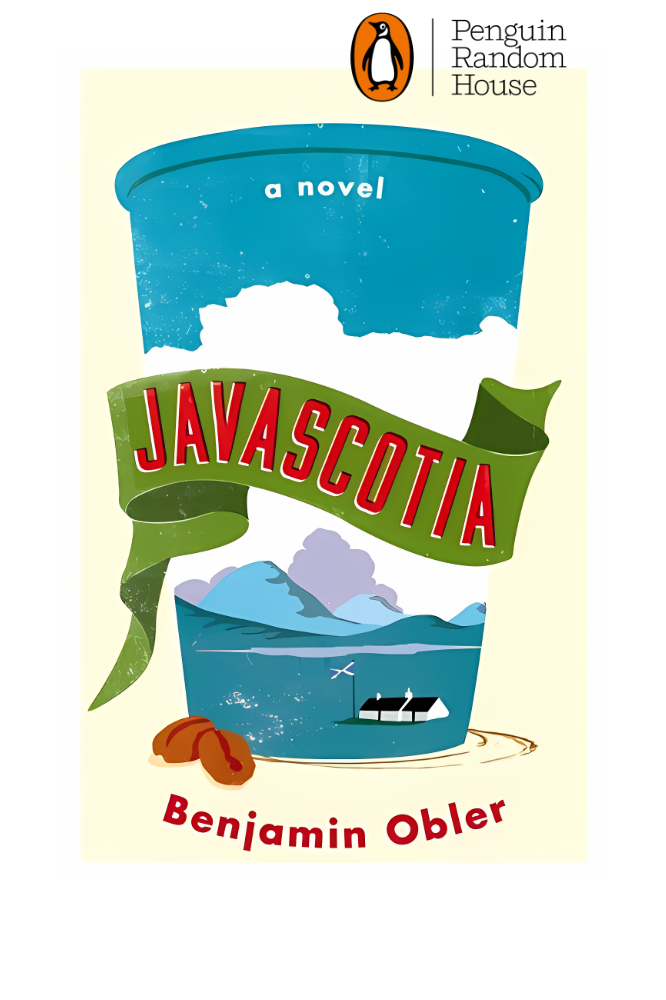
Melvin Podgorski is young, naïve, American - and a coffee fanatic. It’s this passion that leads him from his native Chicago to 1990s Glasgow to scout out the prospects for a US coffee franchise. Looking for an escape from his suffocatingly suburban parents and the tangled wreckage of a divorce, he finds himself floundering in an alien land of Glaswegian dialect and radical student politics. As he becomes increasingly entangled with one particularly charming local and her militant ex-boyfriend, his efforts to keep the past and the present separate are put to the test, and soon his old life in Chicago and his recently found freedom in Glasgow are set for an emotional and catastrophic collision
∯
Imbued with dark, mournful notes, dashes of warm humour and the bittersweet tang of learning the hard way, Javascotia combines a feel-good flavour with a deep substance.
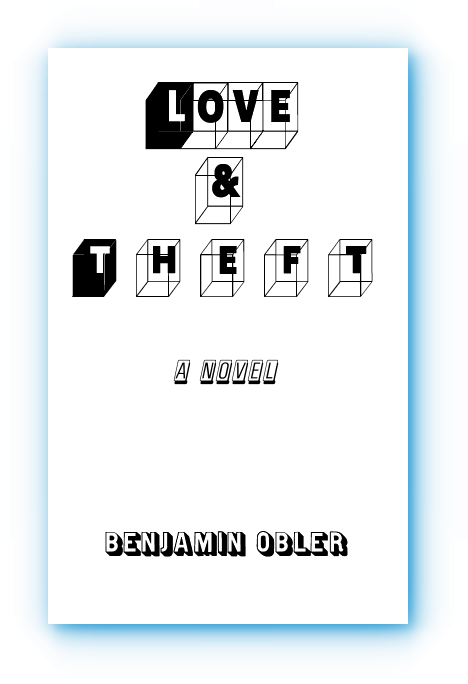
There are those who play at theft, like actress Sylvie Virgule. There are those who claim theft, like Nolan Pilcrow, an insular academic, and those who protect corporations from theft, like Paul Boustrophedon. Some steal to survive, like Hank Delaney. And there are some whose thefts leave them with a nagging conscience, such as Ray Ramirez.
In this kaleidoscopic novel, stories unfold with three groups of characters, disconnected until the very end. In New York City, Midwestern transplant Paul Boustrophedon leaves his fiancée. Disaffected, he bails on dinner at the usual place and stumbles upon a film set, where his pilfering from catering services leads to a conversation with lead actress Silvie Virgule. A lonely LA native, Virgule is entertained by this aloof and unpretentious character. She hires him to act as his Spiritual Advisor during the show’s shoot.
Hank Delaney and Ray Ramirez, meanwhile, are two rural New Yorkers, underemployed and short on options. They concoct a plan to steal a vintage muscle car from Delaney’s high school nemesis, John Segal. What they don’t know is that the car is on lease to a company filming a show in Brooklyn. Ramirez begins a con, wooing Shelby Segal, the sister of the car’s owner, by playing into her desire for stardom as a singer.
In Nova Scotia, a prodigious youth, Walter Chamaran, son of a yoga teacher, gains the attention of local Buddhist monks, who seek to bring the boy to their monastery for observation. His fate is strangely connected to the events in New York.
The return of the leased muscle car brings the three groups together in a spectacular fashion. This marvelously structured work contains the merging of countless opposites: urban and rural, rich and poor, black and white, right and wrong, and Love & Theft.
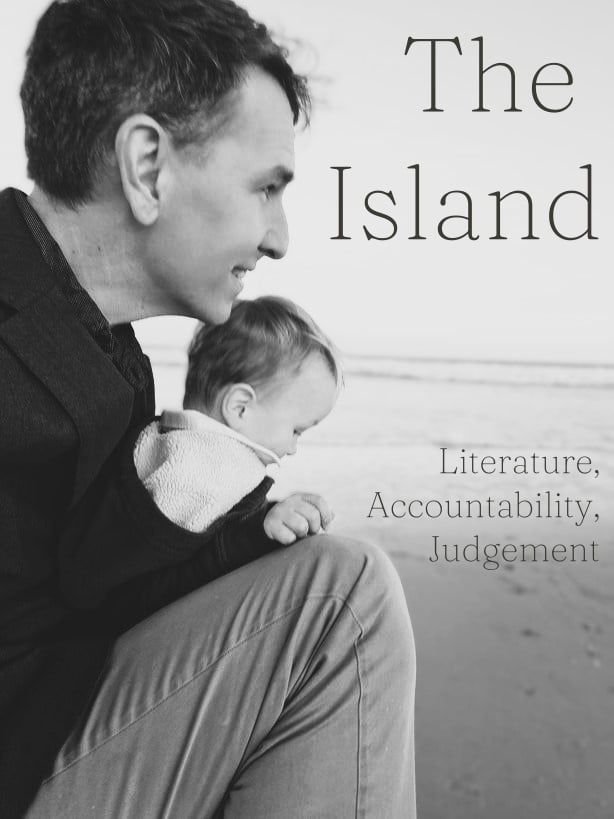
Adventure story meets epistolary meets an inquiry into the heart of the literary aesthetics in America, The Island asks, as novelist Charles Baxter asked in his 1997 essay “Dysfunctional Narratives (or Mistakes Were Made)”: “What difference does it make to writers of stories if public figures are denying their responsibility for their own actions? So what if the president of the United States is making himself out to be, of all things, a victim?”
This troubled consideration of literary values intersecting with Trumpism sees mainstream trade publishing, literary publishing, through the lens of Baxter’s essay, through Kafka’s The Trial, through the Tobias Wolff’s short story “A Bullet in the Brain,” through Rebecca Solnit’s “Keys to the Kingdom: Old Conflicts, New Chapters,” through Uri Berliner’s bold declaration of editorial bias at National Public Radio, through student fictions, through an MFA recommendation letter, and through Milan Kundera’s Testaments Betrayed.
The bibliophile at the center of this kaleidoscopic text retreats to a remote location, leaving his wife and child in hopes of healing his relationship with the thing that’s always mattered most: literature. But when a crate of books is air-dropped to him, a head injury ensues, and his prospects for sailing out of the sea of his own judgements is jeopardized.
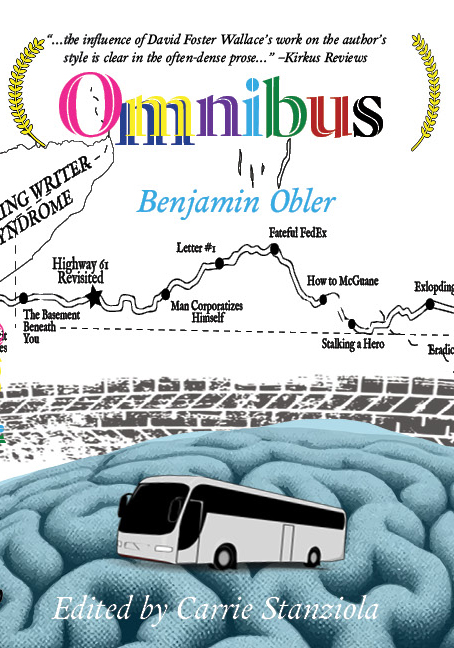
In his 2016 memoir Gone With the Mind , Mark Leyner asks what if a book were a third-person shooter game in which you the reader flew in a balcony with Mussolini into the cervix of Leyner’s mother, Muriel, and destroyed the embryonic matter that was his in utero self. In this same spirit, I wish to explore whether a book—specifically a memoir of my life set in the years 2020 and 2021—can take the form of a cross-country journey on a coach bus in which you the reader play card games with my in-laws while traversing the figurative landscape of a writer’s psyche—my psyche—only to arrive, after a perilous journey over lands fraught with disease, perfidy, and narrative control at one of two gatherings: either a cogent, reasoned academic lecture in a university auditorium or a heated political rally in a bleacher-packed sports arena.
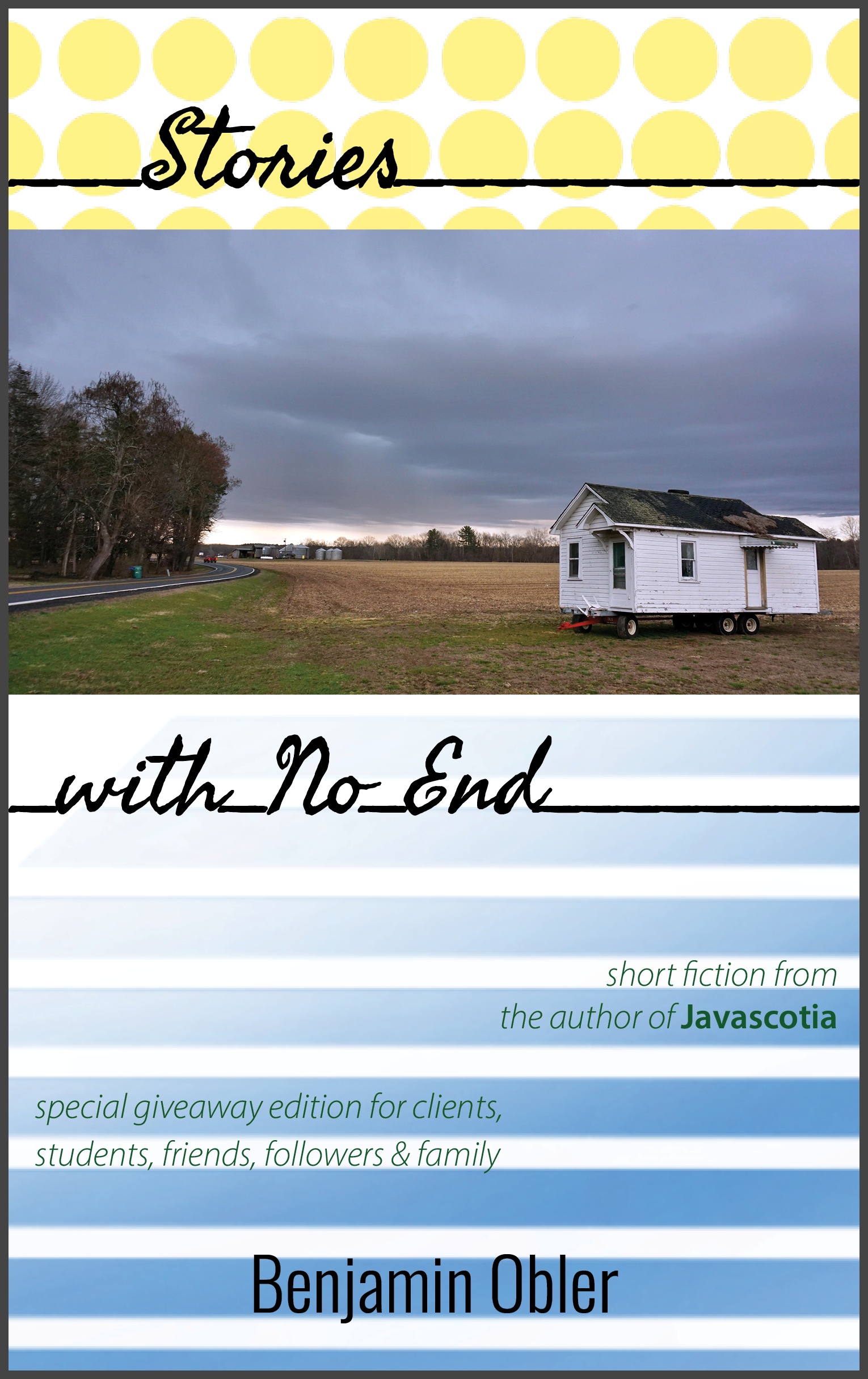
Stories with No End
A Bosnian immigrant seeks acceptance through an act of charity. A Midwestern family grows and shrinks across decades, treating addiction through faith and silence. In upstate New York, a construction crew battles conflicting mandates in COVID’s first lockdown order. In Los Angeles, retributive violence feels justified to a call center employee because surveillance technology enables identifying the offender; but consequence isn’t monitored by door cameras. In Connecticut, a man’s fake identity affords him a life of ease, but loneliness and desire blow his cover. The social perils of Christmas threaten to shatter a St. Paul friendship.
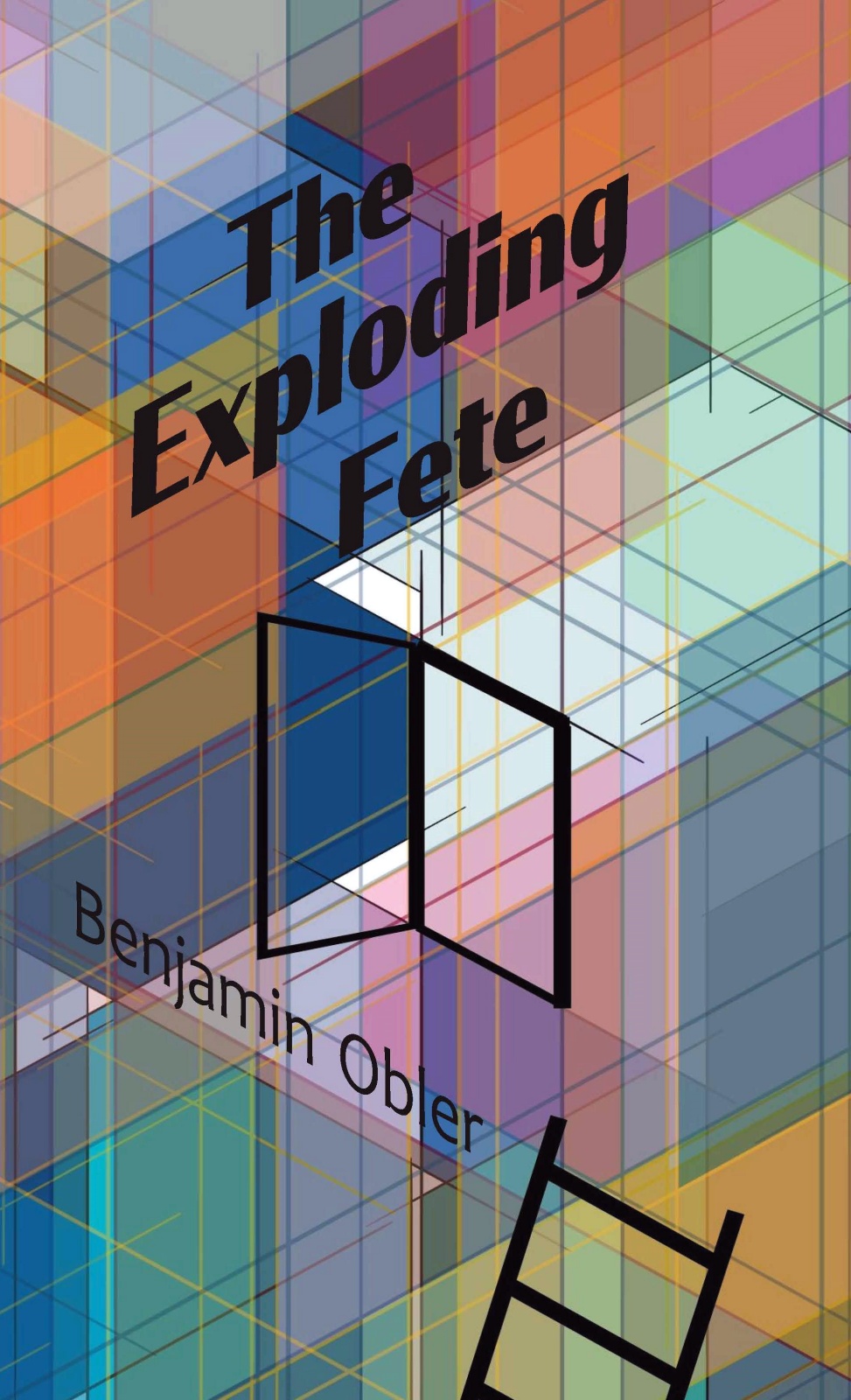
“Passionate people cannot be counted on to act fairly, you understand.” So says the hostess of the gala being thrown one night in the warehouse district of Minneapolis in 2018. This experimental novel was written for NaNoWriMo in 2017 and agented in 2018. It features Narrative Branch Technology(™), not to be confused with Choose Your Adventure, the owners of which are litigious, allegedly. Narrative Branch Technology allows you, the reader, to choose which attendee of the gala wins the FAIR Award and cash stipend at the end of the story. No more suffering at the neglectful hands of media elites!
∯
Far from being a right-wing cultural critique, this work intends to pose questions about the role of media in our culture. Why does attention from media signal acceptance and inclusion? What, instead of media attention, could be awarded to the marginalized, to really create economic parity and understanding across class lines? The publishing industry is only indicted by suggestion. There may even be a celebration of sameness, across the many celebrated cultural differences we enjoy in America.
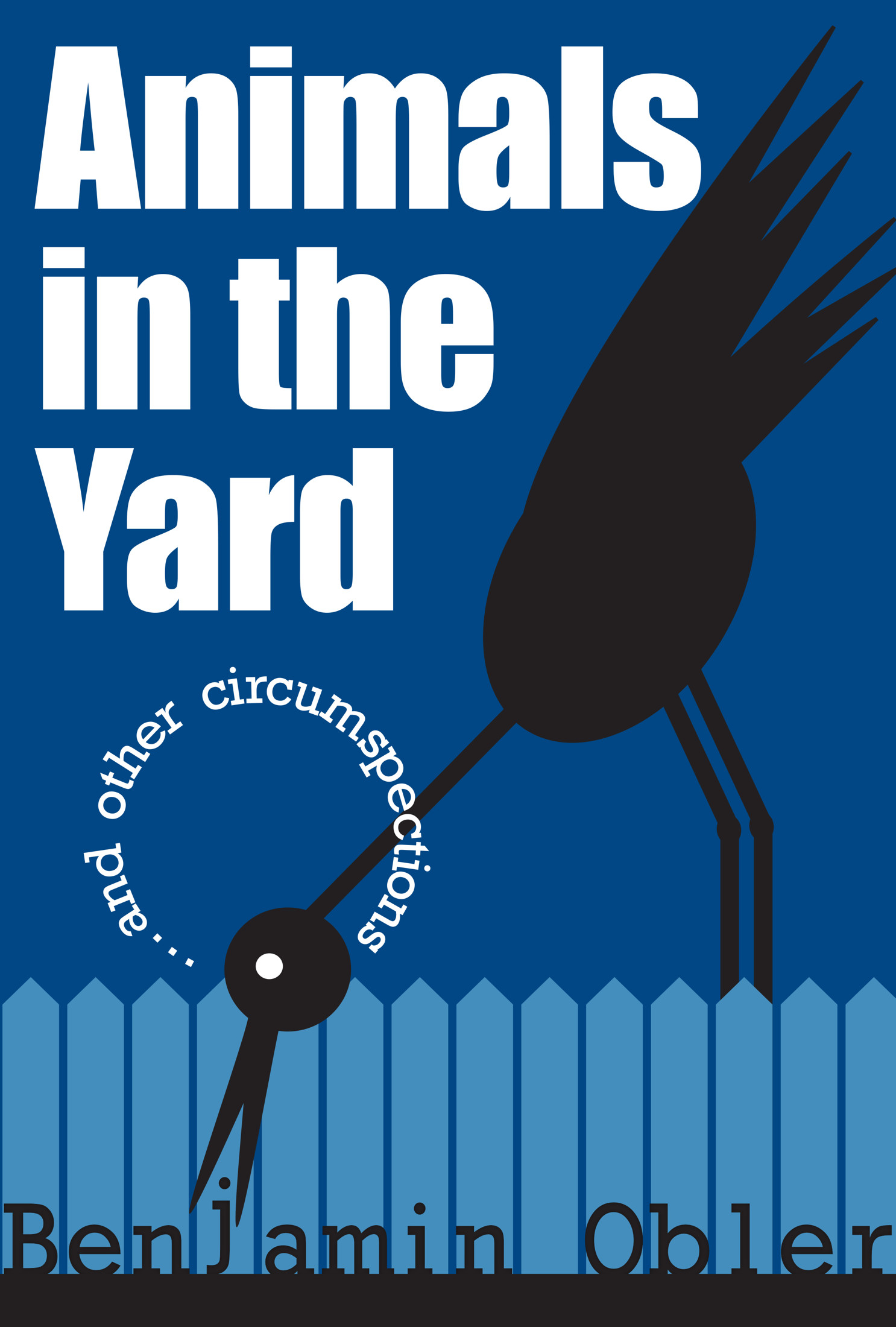
Circumspection is careful consideration of all circumstances and consequences. That’s what these pieces are. “Animals in the Yard” is primary among them, because it concerns the imagination—a preoccupation of mine. People with overactive imaginations know the hazards that daydreaming poses to professions, relationships, and well-being. And they know the richness it affords an otherwise staid life. In the title piece I’m dressing for work in the morning, gathering up those tokens of stature, the corporate ID badge on a lanyard, wallet, phone, keys, etc., when I look out the window to the yard below and leap into a flight of storybook fancy about the neighbor’s dog and a bunny. This moment speaks for the five-year span during which I wrote these pieces, while I worked full-time in publishing, first in Minneapolis, then in New York City.
Subscribe and get freebies and fresh news...
New publications are forthcoming! Thanks for supporting my platforming efforts to drive manuscript sales and get my ideas into the world before there is no world left.
Thank you for subscribing!
Have a great day!
